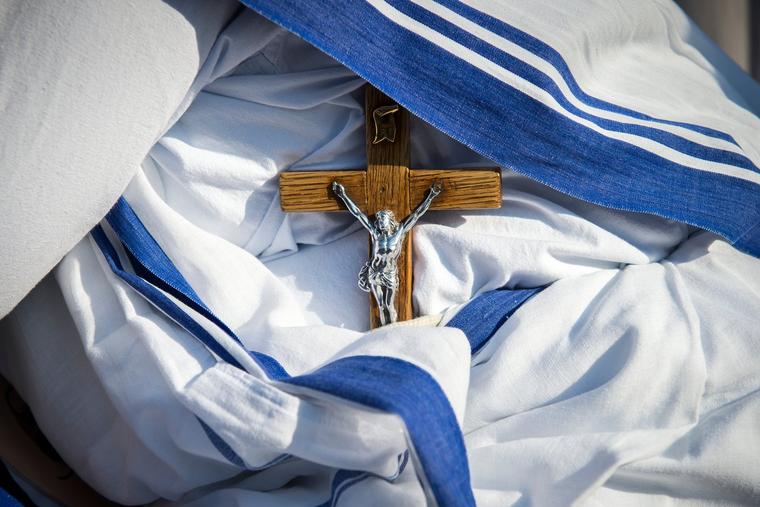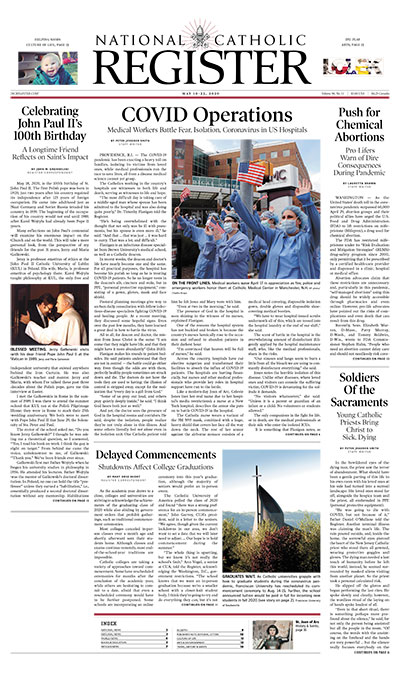A Cause of Joy in Newark: Mother Teresa’s Mission, 42 Years Strong
Only when one gives abundantly with joy, and is joyful, can one become a cause of joy to others.

I am writing a new book on Mother Teresa and recently came across some previously unpublished archival sources.
Reading her letters is always a good spiritual-theological exercise. Letters are a powerful and important source for the theologian and the historian. Her correspondence to both public figures and common people is succinct and straightforward, not verbose — she did not have time to spend on excessive writing.
The letters I am currently researching are written by hand by Mother Teresa, directed to the then-archbishop of Newark, Peter Leo Gerety (1912-2016), who was known for his social justice and anti-war positions and who, during his time as the third archbishop of Newark (1974-1986) consistently gave a voice to the people living on the margins and those suffering either materially or spiritually.
On March 24, 1981, Mother Teresa wrote a letter to Archbishop Gerety as they were preparing a new beginning for the Missionaries of Charity in Newark. The letter begins this way:
Your Grace, Let us thank God for His tender love for us all — for I hope to be able to give you our Sisters to be a cause of joy to your people sometime this year. You must have been praying very hard for this. I hope to be able to bring them in July when I come to the U.S. Before that I could ask the Superior of New York to come to you and arrange together for the foundation. Our sisters’ address is: Sr. M. Priscilla, M.C. Missionaries of Charity, 335 East 145th St., Bronx N.Y. 10451.
Mother wanted her sisters to be a cause of joy to the people of Newark. Joy, although expected of the missionaries, might not have been ranked as the first characteristic or task anticipated to be covered in a letter directed to the archbishop. Instead, one would expect mention of serving the poorest of the poor, running a soup kitchen, serving the unwanted or what society has discarded. However, Mother Teresa focuses on serving in all of these ways, but with one important addition — the service is to be done with great joy.
Her understanding of the theology of joy can be summarized this way: Only when one gives abundantly with joy, and is joyful, can one become a cause of joy to others. Union with God brought joy to Mother. It was a deep-felt spiritual and interior fulfillment, which translated into interior peace. Mother’s joy was real, as one could tell from her gentle touch, broad smile, happy and piercing eyes and radiant face. In her spiritual testament, written hours before her death on Sept. 5, 1997, Mother Teresa speaks of keeping up with being joyful. Hers was a joy rooted in the love of Christ — doing not great, extraordinary works, but rather small, seemingly insignificant, ordinary works of kindness and service, with great love.
Being a cause of joy is also related to Mother’s theology of service. There are two identifying marks of the fourth vow of the Missionaries of Charity: their service is offered wholeheartedly — so there is missionary joy in serving, and the service is gratuitous, offered free of charge to all. The service the Missionaries of Charity were expected to provide in Newark as elsewhere was gratuitous, offered free of charge to all. Someone once told Mother Teresa that not even for a million dollars would they touch a leper. Mother Teresa was very quick to respond:
Neither would I. If it were a case of money, I would not even do it for two million. On the other hand, I do it gladly for love of God.
This is Mother Teresa’s sense of joyful serving, which was manifested as a cause of joy to others. Additionally, her response reflects the subversion of the world order, directly challenging systems and structures that would prioritize profit and material possessions over human beings and their inherent dignity.
Mother Teresa also recognized that a joyful person is a prayerful person. She urged people to pray for others generously. She recognized that there is probably a reason why people come to mind during the day: it is likely because we do or do not get along with the people we think of. Mother’s advice is to pray for all people with joy — she emphasizes that this is a way to spread love and how the circles of joy expand.
Mother Teresa closes her short letter to Archbishop Gerety prophetically. She has nothing to offer but her joyful prayers to God for the archbishop and the people of Newark. Her prayer aims high — likeness with Christ, giving up oneself totally to the will of Christ. This is Mother Teresa’s path to holiness:
My gratitude to you is my prayer for you that you may grow in the likeness of Christ and let Him use you without consulting you.
Mother Teresa’s Missionaries of Charity were established in Newark on June 26, 1981, on the Solemnity of the Sacred Heart of Jesus. Archbishop Gerety and the people of Newark welcomed four missionaries in a beautiful ceremony in which Mother Teresa took part. Archbishop Gerety expressed his gratitude to Mother Teresa in a letter dated June 24, 1981, stating:
The archdiocese of Newark, its Bishops, priests, religious and people are overjoyed at your presence among us and at your very great generosity in assigning some of your dear nuns to help us. We all pray that God will bless you and your Sisters many times over for your devotion to Him and to His people.
The Missionaries of Charity are still serving in Newark. It is a 42-year history still in the making. The sisters have indeed been a cause of joy, inviting others to acts of joy.












